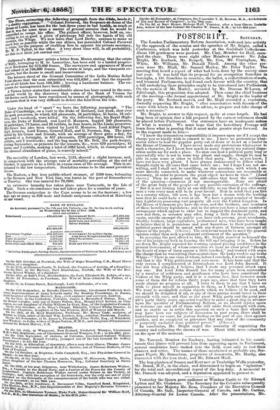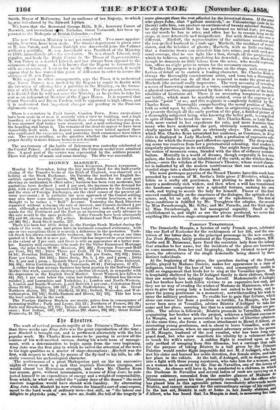POSTSCRIPT. SATURDAY.
The London Parliamentary Reform Association, wakened into activity by the approach of the session and the speeches of Mr. Bright, called a Conference, which was held yesterday at the Guildhall Coffeehouse. About 120 gentlemen were present. Mr. Clay, Member for Hull, occu- pied the chair. There were eight other Members present : Mr. John. Bright, Mr. Roebuck, Mr. Roupell, Mr. Cox, Mr. Coningham, Mr. White, Mr. Williams; Mr. Donald Nicoll. Among the other per- sons were Mr. Midi, Mr. Samuel Morley, Mr. Peter Taylor. The meeting first heard a report of what had been done by the society since last year. It was held that its proposal for an occupation franchise in boroughs, a 10/. franchise in counties, the ballot, a redistribution of seats, and triennial Parliaments, had found such favour with the country, that a bill embodying these principles ought to be introduced into Parliament. On the motion of Mr. Morley, seconded by Mr. Duncan M'Laren, of Edinburgh, this proposition was adopted. 'Then came the chief business of the meeting—the formal appointment of Mr. Bright as the leader of the party. Mr. Roebuck moved, and Mr. Miall seconded a resolution, formally requesting Mr. Bright, " after consultation with friends of the cause with whom he may see fit to advise, to prepare and take charge of such a measure."
Mr. Bright, in answer to this request, spoke at some length. He had long been of opinion that a bill prepared by the earnest reformers should be placed before Parliament. Our statesmen have an inadequate notion of what is wanted. We must hope that the hereditary Peerage will learn from what is passing that it must make greater steps forward. As to the request made to him— "I know the tremendous responsibility it imposes upon me if I accept the charge you so kindl wish to commit to me. I have no pretensions what- soever either to leadsthe popular party out of doors or to act as a leader in the House of Commons. I have never made any pretensions whatsoever to such a character, for I know how muckin many respects my natural (lisp- aition unfits me for such a place. No man can lead a political party long or successfully who is not in some way pliant and supple, though he may be able in some sense or other to follow that party. NOW' as you know, I have not been very pliant. I have always endeavoured to follow what I thought right in all cases that came before me ; but I hope I am not un- willing, and I shall not be unwilling, on this question, with which I am more directly connected, to make whatever concessions are reasonable or necessary, in order to promote the great object we have in view." (Loud cheers.) Then he pointed out the difficulties that beset the settlement of the question—enormous if not unconquerable. None are afraid of the great body of the people—of any possible extension of the suffrage. " But it is not looking fairly at our difficulty to say that if you offer every man a vote every man will be in your favour. Bear in mind that you live in a country where, till now, it has been but a dream with the working man that he could have a vote at all. We have a great number of heredi- tary legislators possessing vast property all over the United Kingdom. La the House of Commons you have the sons, and the brothers, and nominees of those hereditary legislators; and in the press you have a large number of newspapers which appear to exist but to support the dominant party, and now and then, as occasion may offer, doing a little for the public. And again, outside amongst the public you have rich persons, great merchants, wealthy bankers, large capitalists, professional men, who have been taught to believe that it is pernicious and most hazardous to their position that political power should be spread with any degree of fairness amongst all classes of the people. (Cheers.) The endeavour must be to meet the general opinion rather than seek a permanent settlement of the question."
In accepting the post offered to him, 11r. Bright reserved to himself the use of his judgment both in framing the bill and bringing it in. Before he sat down Mr. Bright repeated his warning against placing confidence in the present Government, of whose conversion we have no clear proof "though the hearts of some of them appear a little touched," and treated with scorn the charge that he was setting class against class. He hada word to say to the Whigs—"There is one class of whom, before I conclude, I would say a word, and that is the Whig politicians and statesmen. It has been said that the only person I complimented at Birmingham was Lord John Russell. It has not been alleged, I believe, that I made any personal attack upon any one. But Lord John Russell has for many years been, surrounded by a number of noblemen and gentlemen who have been considered the leaders of the Whig party, and it is a curious fact, that however much some of them did for reform thirty years ago, since that time they have made almost no progress at all. I refer to them to say that I have no wish to place myself in opposition to them, as I believe you have not. We want to accomplish certain objects which we believe to be good, and we should be delighted if all, or any of those parties would throw in their strength with ours, and that as the great Whig party and the great peo- ple's party thirty years ago acted together to make a great step in advance upon the question of Parliamentary Reform, so we should rejoice again to welcome one and all of them who will unite their strength with ourN and so enable us to settle this question on such a basis that whatever may have been our subjects of dissension in past years, there shall be henceforward no cause for jealous feeling on the part of one class against another, and no complaint or grievance that any class of the community is purposely excluded from political power." (Cheers.) In conclusion, Mr. Bright urged the necessity of organizing the country and collecting the sinews of war. About 4001. were subscribed on the spur of the moment.
Mr. Tancred, Member for Banbury, having intimated to his consti- tuents that illness will prevent him from appearing again in Parliament, several candidates have rushed into the field, some only to test their chances and retire. The names of those mentioned as probable are, Ser- geant Pigott, Mr. Samuelson, proprietor of ironworks, Mr. Hardy, also connected with the iron trade, and Mr. Edward Miall.
The hop planters of Sussex and Kent met at Tunbridge Wells yesterday, Mr. Brand, M.P., in the chair, and determined to begin an "agitation " for the total and unconditional repeal of the hop duty. A memorial to Mr. Disraeli was adopted, and a deputation appointed to present it.
Yesterday the Queen gave audience at Windsor Castle to Sir Edward Lytton and Mr. Gladstone. The Secretary for the Colonies subsequently presented to her Majesty Mr. Ross, President of the Executive Council of Canada, Mr. Galt, Inspector-General of Canada, and Mr. Cartier, Attorney-General for Lower Canada. After the presentations, Mr. Smith, Mayor of Melbourne, had an audience of her Majesty, to which hpffes introduced by Sir Edward Lytton. We learn that the Reverend George Hills, B.D., honorary Canon of Norwich, and incumbent *St. Nicholas, Great Yarmouth, has been ap- pointed to the Bishopric of British Columbia.—Post.
The new Prussian Ministry is not yet cmnpleted. Two more appoint- meets, however, have been made. The finance department is given over to 11.' you Patow, and Baron Rudolph von Auerswald joins the Cabinet Witout a portfolio. M. Toll Auerswald was President of the Ministry in 1848, immediately after the revolution. He is a stanch Liberal, very permit& and leads the Right Centre in the House of Representatives. 31: von 'Patow is a decided Liberal, and has always been opposed to the extension of the army. As it is blown that the Regent is favourable to such as extension, at least so far as the officers are concerned, it would appear that he has waived this point of difference in order to secure the services of M. voii Patow.
' With regard to other arrangements, says the Mires, it is understood that Baron Bunsen was invited by the Regent to repair to Berlin with the intention of offering hint a portfolio in the Ministry, on the forma- tion of which the Baron's advice was taken. For the present, however, it is decided that he will not enter the Ministry, as he prefers to take his scat as an independent Member of the Upper Rouse. It is reported that Count Pourtales and Baron Irsedom will be appointed to high offices, and it is understood that important changes are pending in the Prussian diplomatic corps.
There is a cemetery in Pratt Street, Camden Town. Some excavations have been made in or near it recently with a view to building, and a high hoarding set up to prevent the curious from observing what was going on. It was assumed that bodies were removed, and a mob collecting tore down the hoarding and burnt it. The remains of the dead do appear to have been shamefully dealt with. In August summonses were issued against those 1010 sanctioned the excavations, and yesterday fresh summonses were taken out. The case is pending, as the question whether the authorities have a Proper faculty to move human bodies is not decided.
The anniversary of the battle of Inkerman was yesterday celebrated at the Crystal Palace. All soldiers wearing the Crimean medal were admitted free. A good part of the service was represented by the soldiers present. There was plenty of music and some dancing. The fete was successful.



































 Previous page
Previous page